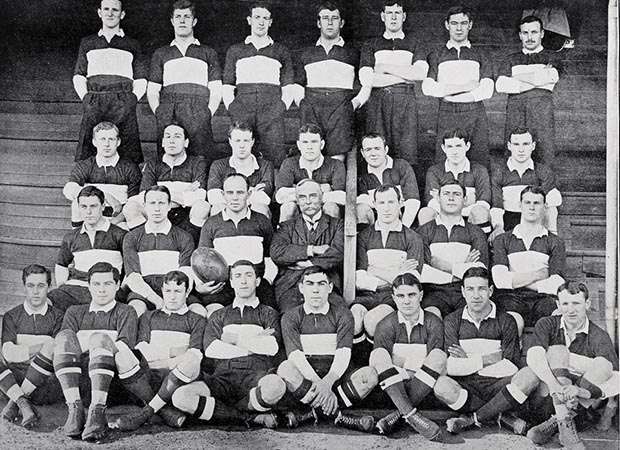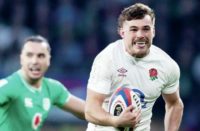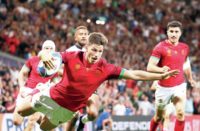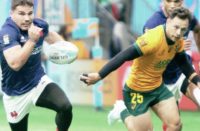 The 1908 ‘Lions' tour of New Zealand was, at first glance, a miserable failure with humiliating drubbings in two of the three Tests, but strangely it did succeed in its primary aim which wasn't necessarily beating the All Blacks.
The 1908 ‘Lions' tour of New Zealand was, at first glance, a miserable failure with humiliating drubbings in two of the three Tests, but strangely it did succeed in its primary aim which wasn't necessarily beating the All Blacks.
What the hastily convened 1908 Lions did was to play a massive role in preventing New Zealand from becoming a Rugby League hotbed. The history of international Rugby Union might have been very different had they not ventured south again just four years after their tour in 1904.
It was the 1905 All Blacks tour of Britain and France that changed everything. Not only were New Zealand a very fit, highly-trained squad, their generous daily allowance of three shillings (15p) a day saw them stand accused of cursed professionalism. The majority of the team were not wealthy amateurs, they were farmers or modest tradesmen and the daily allowance on such a long tour was clearly broken time payment by any other name.
Feathers were ruffled, particularly in Scotland and Ireland, and subsequent events only inflamed the situation. In the 1907-8 season Albert Baskeville brought over another New Zealand side that were labelled the “Professional All Blacks” who played mainly the “northern code” including three Tests against the Northern Union at Headingly, Stamford Bridge and Cheltenham.
The New Zealanders won that series 2-1 and on the way back they also undertook a three Test series against Australia, also winning two of the three Tests. The latter was a huge success and established Rugby League as the game of choice in Australia while on returning to New Zealand the tourists, in a hurried- ly arranged exhibition game between the Reds and Blacks attracted an 8,000 crowd. Rugby League was on the march.
Back in Britain supporters of the amateur game were aghast and it was suggested that a tour party be raised asap to visit New Zealand and Australia and fly the flag for the Union game and to show the ‘Colonials' the error of their ways. The English and Welsh Unions were keen but the Scots and Irish wanted nothing to do with such grubby financial matters and boycotted the project outright.
No matter an Anglo/Welsh tour party was gathered under the captaincy of Wales skipper Arthur ‘Boxer' Harding who along with Pat McEvedy, a Kiwi at Guy's Hospital, was the only survivor of the 1904 tour party.
The 1908 tour was anti-professional in its inception and the 26-man party were mostly of a kind – 20 educated at public school, six of whom were at university and another four who were medics at Guys.
The squad wasn't without talent – 11 internationals and another seven players who were subsequently capped – but it lacked true star quality and their drinking and womanising shocked the New Zealand public. Despite the natural advantages that being on tour offers there seemed an aversion to organised training or indeed pre-determined tactics. The 1908 Lions were almost evangelical in their wish to demonstrate that rugby was a pleasurable pastime, not a profession, and that victory if it came would be achieved through effortless superiority.
That approach didn't remotely mesh with the prevailing rugged frontiersman attitude of most New Zealanders – in work and play – in which everything you achieved in life was down to ferocious work ethic and overcoming all obstacles through persistence, graft and teamwork.
As the New Zealand journalist RA Barr commented in his tour book: “There was a casualness about the whole proceedings which struck the serious- minded New Zealander as being quite foreign to the subject. The majority of the Anglo-Wales side landed in New Zealand pounds overweight, ill-fitted to battle up against the highly trained New Zealand provincial sides and with only an outside chance against the flower of the Dominion.”
Harding agreed but was unrepentant. “We could not help noticing the fine state of fitness in which every man appeared to take the field… it is quite evident that much more attention is given to preparation than in the Old Country where a man practices twice a week only and such a thing as getting a side to live together for a week prior to a match – no matter of what importance – is absolutely out of the question and unheard of, and would not be tolerated by the governing bodies.”
Ridiculously Harding's squad also got caught up in a Catch 22 of their own making. As they weren't fit enough, they picked up an abnormal number of injuries but – making a virtue of their strict adherence to the game's law and ethos – throughout the tour they declined the New Zealand offer of using replacements. Hence they finished the majority of their games shorthanded.
While the tour party didn't spare themselves in terms of food and drink during the six-week voyage to New Zealand, provincial sides gathered three or four nights a week to train for their big games while plans were put in place for the selected New Zealand teams to travel to their Test match destinations a week ahead of time. The Lions were being well and truly ambushed.
Fresh off the boat they scrambled a 17-3 win over lowly Wairarapa but then came defeats against Wellington and Otago before they were nicely stitched up before the first Test in Dunedin, being required to play Southland in Invercargill three days earlier.
Despite everything there was a real excitement ahead of the first Test, a rare chance for a new emerging nation to flex its muscles against the motherland. But there was controversy as well with the New Zealand Union shamelessly doubling the admission charge from one shillins to two shillings which caused much disquiet.
It didn't, however, stop a then New Zealand record crowd of 23,000 attending although hundreds – possibly thousands – of those gained admittance after the perimeter fencing had been knocked down. On the pitch, a cracking New Zealand side – with 1905 veterans such as Billy Stead, left, Jimmy Hunter, Bob Deans, George Gillett and Charlie Seeling to the fore – made short work of an outclassed Lions side as they ran in seven tries. The Lions only reply came from wing Reggie Gibbs which was converted by FS Jackson, the Cornwall and Leicester Tigers forward.
It was an ominous thrashing and the Lions mood was not improved by the sight of former All Black captain John Duncan, the New Zealand tour manager in 1905, refereeing the game and sharing lemons with his old colleagues at half-time. They could rightly chunter in private about that but they were still undeniably second best with only Jackson in the pack seemingly up to the task.
What followed was a rare case of New Zealand complacency which should probably have cost them the second Test. The Kiwis untypically made eight changes from that winning combination and nearly came a cropper as the newish line-up struggled to gel in the wet, mud and wind of Wellington but escaped with a 3-3 draw. The conditions slowed the game which was to the victors liking and if Harding had converted a try by Pontypool's John “Jack” Jones in front of the posts they would have been home and hosed. New Zealand had scored a solitary penalty so under today's scoring system the Lions would have won anyway.
This brave draw had been achieved without Jackson, their best forward, who had been recalled to England under mysterious circumstances on the eve of the game to answer serious, but at the time unspecified, charges by the RFU. Everybody rightly assumed that it would somehow be connected with allegations of professionalism but, as we shall see on the right of this page, the true story was to unfold in a manner that nobody would have predicted.
That welcome flash of defiance in the second Test heralded a welcome run of four wins against some of the weaker provinces before the New Zealand part of the tour – which for the first time achieved star billing over the games that followed in Australia – ended with three disappointing defeats on the trot.
The bubble burst with a 5-0 defeat against Taranaki in New Plymouth and then, like others before them, the Lions found the temptations of Auckland in the final week on tour too much. After losing 11-0 to Auckland, the prospect of more roistering before and after another unscheduled match against the Maori in midweek in Rotorua proved too much, and it was a bedraggled party that presented themselves at Eden Park for the third Test a couple of days later.
New Zealand, having learnt their lesson, wasted no time in returning to their first choice XV and duly administered a nine-try 29-0 drubbing.
The Lions were frankly a shambles, as their chaotic departure from Auckland harbour after a riotous lunch highlighted. First Bristol forward Percy Down fell in the harbour as he lurched over the ship railing to say farewell to friends and had to be rescued Second Blackheath wing Henry ‘Jumbo' Vassall missed the boat altogether after being detained by lady friends in the Eden Park area. Vassall had to write a grovelling letter of apology to the NZRFU in order for a new ticket to be purchased for a later departure as he chased his colleagues across the Tasman Sea to Australia. The 1908 Lions left New Zealand as they arrived, a high- spirited but shambolic bunch of party- loving and outclassed amateurs.


























